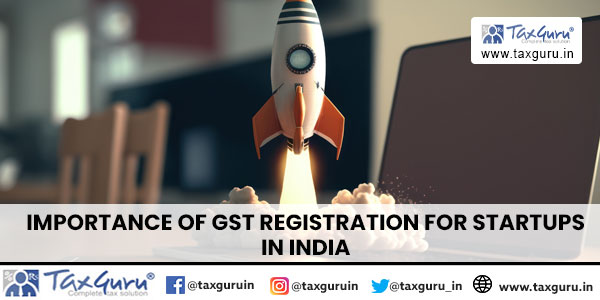In India, starting a business can be thrilling due to the challenges and immense opportunities this market has to offer. Adhering to the compliance and regulatory requirements, mainly taxation, is one of the key aspects of joining this diverse ecosystem in India. GST is an essential tax compliance that startups must register under this tax form if they fulfill the eligibility.
Good and Service Tax (GST) Registration isn’t just a compliance requirement as it also offers many benefits to your business and contributes to long-term growth. The article elucidates the importance of GST Registration for startups in India.
1. Ensuring Compliance
For businesses, mainly startups, it’s essential to fulfill the compliance obligations as it helps keep non-compliance consequences like penalties, fines, or legal consequences away, and thus, entrepreneurs can fully focus on growing their business. In case of non-compliance, the business operations may have to face legal consequences, which can disrupt the operations either for the short term or sometimes long term, if the penalty is severe.

GST Registration in India is a must for businesses having a turnover of over Rs. 40 lakh for product-based businesses. While for the service-based businesses, the turnover limit is Rs. 20 lakh. GST Registration is also essential for businesses involved in inter-state trade, exports, or operating in specific sectors.
If startups fail to register under GST, they may have to face significant fines or penalties that most startups can’t afford. Registering under GST enables smooth operations of the startups with no legal risk and also can help them build a reputation in the market, leading to a larger customer case.
2. Availing Input Tax Credit (ITC)
One of the standout features of GST is the availability of Input Tax Credits (ITC). With ITC, businesses can claim a credit for the GST they’ve paid on purchases, thereby reducing their overall tax liability.
At their early phase, startups often have financial restrictions, so this provision can be a game-changer. For instance, if your business pays GST on raw materials, services or machinery/equipment, you are eligible to offset this against the GST collected on sales, thus improving your cash flow and reducing operational costs.
3. Expanding Market Opportunities
GST has unified the taxation system across India, removing barriers that previously complicated inter-state trade. For startups, this is a great opportunity as they can expand their customer base by foraying into new markets without worrying about additional state taxes like VAT or CST.
When it comes to e-commerce businesses, GST Registration is particularly important. The reason is leading e-commerce platforms like Amazon, Flipkart and others require a GST number to register on them. Without a GST number, businesses can’t register their products/services and thus miss their opportunity to expand their customer base using the evolving power of AIdigitalization.
4. Building Trust and Credibility
In such a diverse and competitive market, credibility is the key decisive factor that can help build or break a startup. Displaying a GST Number on invoices, official documents, and packaging, ensures that a business is legitimate and complies with tax authorities. Such actions of transparency help build trust with customers and also reassures potential investors, business partners and other business associates. Startups that fulfill tax compliances and maintain their clear records, have higher chances of attracting more funding and collaborations.
5. Simplifying Operations
GST has unified multiple indirect taxes, thus making taxation compliance simpler and thus easier. This unified tax simplifies tax compliance for startups so that they can focus better on their business growth.
Online GST filing system allows startups to file returns, track payments, and access necessary documents digitally. As a result, it saves both time and resources of the entrepreneurs, so that they can invest in their business growth.
6. Easy Access to Government Incentives
GST Registration unlocks numerous benefits in the form of allowing access to schemes offered by the government. By registering under GST, startups can access tax refunds, export incentives and other financial advantages.
In addition, GST-registered businesses also gain access to many government tenders and contracts. As a result, you can say that registering under GST opens up a gateway to work on large-scale projects, providing startups with a significant boost in credibility and revenue potential.
7. Avoiding Supply Chain Issues
GST Compliance is not just a compliance requirement but can also put a significant impact on the supply chain and potential customers of the startups. The reason is, vendors often associate with businesses registered under GST instead of those that are not registered. As a result, registering under GST can help avail supply chain smoothly and deliver your products to the final consumers.
Registering under GST makes sure that startups don’t need to experience any problem in sourcing materials or providing services, which could otherwise slow down your operations.
Challenges with GST Registration
With multiple GST benefits for startups, there are numerous challenges associated with GST registration, too. The challenges associated with the GST Registration process and ensuring compliance with this tax form are as follows:
- Complex Procedures: The GST registration process can be complicated and thus confusing for entrepreneurs who have recently joined the startup ecosystem in India.
- Ongoing Compliance: Filing regular returns to stay compliant to GST requires consistent efforts. In short, it’s an ongoing compliance making it a bit challenging.
- Cash Flow Management: Startups often fail to claim their ITC at their initial phase, which can adversely impact business cash flow.
Reach out to GST Experts to get professional help and overcome these challenges and ensure compliance with this tax form.
Conclusion
GST registration is not just a statutory obligation for startups, but it’s a strategic move that can provide numerous advantages. There are a number of benefits that startups can avail through GST registration; from reducing tax burdens through Input Tax Credit to expanding market opportunities and enhancing credibility, etc.
Startups looking to establish themselves in India must prioritize GST compliance to ensure smooth operations, attract investors, and build a strong foundation for growth. While the initial process may seem daunting, the long-term rewards make it a step worth taking. By embracing GST, startups can unlock their potential in India’s rapidly evolving business ecosystem.





